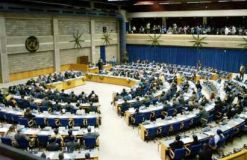UN Security Council discusses Darfur, shuns rebels
NAIROBI, Nov 18 (AFP) — The deteriorating situation in Sudan’s troubled Darfur region received secondary attention during a meeting Thursday of the United Nations Security Council in Nairobi as emphasis focused on the search for peace in southern Sudan.

|
|
General view of the Uited Nations Security Council meeting in Nairobi November 18, 2004. (Reuters). |
Members saw ending the 21-year civil war between Khartoum and southern rebels, both as an end in itself and as way to conclude the conflict in Darfur, which has left tens of thousands of people dead and displaced some 1.5 million.
The Sudanese government and the southern Sudan Peoples’ Liberation Movement/Army (SPLM/A) have already the broad outlines of an agreement in the form of the Naivasha protocols and are negotiating the modalities for their implementation and a permanent ceasefire.
They expect to sign a comprehensive peace agreement by the end of the year.
Many believe that the same formula used to resolve thorny issues between Khartoum and southern rebels such as power and wealth-sharing could apply to Darfur.
UN Secretary General Kofi Annan told the Council in an opening speech that the signing of final peace deal between the north and south “will also serve as a basis and catalsy for the resolution of existing conflicts.”
It will “add weight and impetus to the search for peace in Darfur. Naivasha offers a good basis on which to build,” he emphasized.
Sudanese Vice President Ali Osman Taha and leader of the SPLM/A John Garang also stressed the importance of ending the north-south conflict in speeches during the opening session of the Security Council meeting.
Garang noted that the situation in Darfur was deteriorating rapidly, but maintained that priority must be placed on the southern conflict.
“The only way to avert this tragedy (the Darfur crisis) is to expedite the Naivasha process,” said Garang.
Council president, United States ambassador John Danforth, agreed.
“We think that peace throughout the country, the north-south peace agreement, is related to the future of Darfur, he told reporters.
Danforth further denied that the Council was neglecting the conflict in Darfur by concentrating on a deal between the north and southern.
“There is continuing interest in Darfur,” he asserted.
Despite Danforth’s statement on the international community’s concern about the situation in Darfur, representatives from the two main ethnic minority rebel groups in the region, did not attend the session as they had hoped.
Ali Ahmed Rao of the Sudan Liberation Movement told AFP earlier that an SLM delegation was in Nairobi and expected to participate at the meeting, saying they had been in contact with the UN secretariate about being accredited.
Members of the Justice and Equality Movement, another other Darfur rebel group, were also not present at the meeting after saying that they had been invited to attend and that they would participate.
“We are participating,” Ahmed Adam, a spokesman for the JEM had told AFP, adding that a delegation would arrive in Nairobi in time for the meeting.
Danforth ruled out any prospects of the rebels attending.
“This is not the appropiate venue for them,” he said.
The rebels were not immediately available for comment.
The Council will instead hear Friday from four Sudanese representatives from civil society in an extraordinary “Arria Formula” briefing about daily life in their country and present recommendations for establishing and maintaining peace.
“The meeting offers Council members an opportunity to hear first-hand the concerns and hopes of the people of Sudan,” according to a UN statement announcing the briefing, which was organized by the Sudan Advocacy Coalition, a group of six international aid agencies operating in Sudan.
